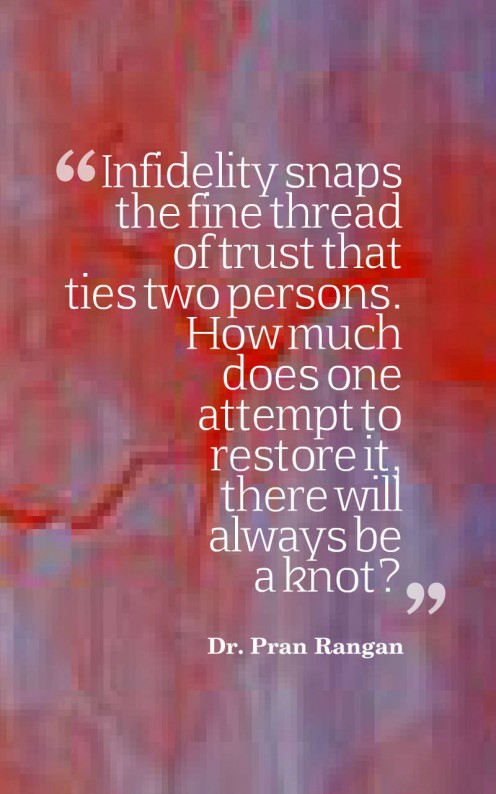Infidelity and Its Types

Infidelity takes various forms. Its boundaries are so ambiguous that even couples have different views about it. But the general rule is that any behavior that causes feelings of betrayal and rejection in a partner is defined as infidelity.
Types of Infidelity -
Below are enumerated as to what really counts as infidelity and what doesn’t.
Physical infidelity – It is the most clear-cut form. Most couples would consider one partner engaging in sex or sexual contact with someone else infidelity. There are some gray areas as well such as if kissing is defined as infidelity.
Emotional infidelity – It is as damaging as physical one albeit much harder to define. There’s no reason why men and women can’t be friends. These relationships only cross the boundary into infidelity when there’s an element that goes beyond friendship.
The emotional attachment to someone outside of marriage leading to interactions that one feels one need to hide or lie to the partner amounts to emotional infidelity. Similarly, sharing intimate details of one’s life or relationship problems with someone one has an attachment or attraction to would certainly blur boundaries too.
Cyber infidelity – It’s never been easier to connect with people online. When it’s easy to connect, it’s easy to cheat. Cyber infidelity is particularly relevant to those who met their partners online. Regarding determining cheating, there’s no one size that fits all because every individual will have his or her own boundaries.
Loyalty to someone or something other than spouse – It is a common form of infidelity. Nevertheless, most of us don’t consider it to be wrong. Giving your primary loyalty to your parents, friends or career ahead of your spouse is being unfaithful. In fact, if we begin to give first and best loyalty to our marriage, they will dramatically improve.
Mental infidelity – In actuality, infidelity begins in the mind, not in the bedroom. When an individual is acting out sexual fantasy apart from spouse, it’s an act of mental infidelity. In fact, watching porn, watching or reading erotica and graphic romance novels all contribute to mental infidelity.
Comparison with others - The very act of looking and lusting objectifies others and creates insecurity through unfair comparison of the spouse with others. It may subtly begin to pull someone away from the spouse and tempt one to cross over the boundary to infidelity. So, it is prudent to keep eyes and heart focused on the spouse!
Keeping secrets - Marriage must be built on a foundation of total transparency and trust. Keeping secrets is actually an act of infidelity. In marriage, they are as dangerous as lies.
Threats of divorce - Divorce has become far too commonly in our society. Threats of divorce break the sacred trust, shaking the very foundation of the institution of marriage. So, such threats, when given frequently, lead to entering emotional infidelity territory.
Engaging closely with strangers - If you engage in a way with a stranger that helps you fill whatever void you have in your primary relationship, you're entering emotional infidelity territory.
Work spouse – Work spouse is someone you spend all of your time with and share all of your secrets, even if they're just work secrets. Make sure your actual spouse knows about your work life. Your partner may not be in the trenches with you but that doesn't mean you need to keep him or her in the dark. Otherwise, it may amount to infidelity.
The Bottom Line –
According to the Kinsey Reports, around half of men and a quarter of women studied had committed adultery.
According to the Janus Report of sexual behavior in America, one third of married men and a quarter of women have had an extramarital affair.
Despite the fact that the majority of the extra-marital affairs are shrouded by the veil of secrecy, the above statistics may surprise many of us. Therefore, it becomes difficult to find out their exact prevalence in the society, though they differ in prevalence from place to place.
Even people in satisfying relationships find themselves crossing the line they never thought they would. Psychologically speaking, they often stray not because they want to find another person but because they want to reconnect with a different version of themselves, which is a thrilling discovery to them. They want to leave the person that they have themselves become.
Above all, most have their own perceptions as to what constitutes marital infidelity. So its exact prevalence can’t be gauged in a society that faces many changes of perceptions about various things from time to time.
Reference -
Greeley, A. Society (1994) 31: 9. https://doi.org/10.1007/BF02693241; Publisher Name Springer-Verlag









